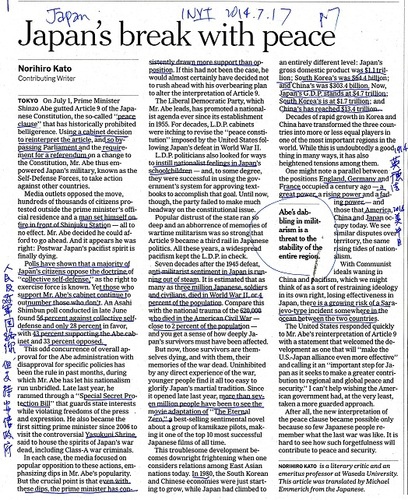Norihiro Kato New York Times July 17, 2014
英文 http://www.nytimes.com/2014/07/17/opinion/norihiro-kato-japans-break-with-peace.html
中文 http://cn.nytimes.com/opinion/20140718/c18kato/zh-hant/

林中斌 20014年7月25日
Professor Kato of Waseda University criticized Prime Minister Shinzo Abe for circumventing the Parliament to “gut” the Artcile 9 “peace clause” in the Constitution. He observed that a majority of Japanese people opposed Abe’s militarist policy but supported Abe administration. He made an astute comparison between 1914 and 2014. Then, England, Germany, and France were the great power, the rising power, and the fading power respectively. Today, a parallel is seen in the U.S., China, and Japan.
Chong-Pin Lin July 25, 2014
TOKYO — On July 1, Prime Minister Shinzo Abe gutted Article 9 of the Japanese Constitution, the so-called “peace clause” that has historically prohibited belligerence. Using a cabinet decision to reinterpret the article, and so bypassing Parliament and the requirement for a referendum on a change to the Constitution, Mr. Abe thus empowered Japan’s military, known as the Self-Defense Forces, to take action against other countries.
Media outlets opposed the move, hundreds of thousands of citizens protested outside the prime minister’s official residence and a man set himself on fire in front of Shinjuku Station — all to no effect. Mr. Abe decided he could afford to go ahead. And it appears he was right: Postwar Japan’s pacifist spirit is finally dying.
Polls have shown that a majority of Japan’s citizens oppose the doctrine of “collective self-defense,” as the right to exercise force is known. Yet those who support Mr. Abe’s cabinet continue to outnumber those who don’t. An Asahi Shimbun poll conducted in late June found 56 percent against collective self-defense and only 28 percent in favor, with 43 percent supporting the Abe cabinet and 33 percent opposed.
This odd concurrence of overall approval for the Abe administration with disapproval for specific policies has been the rule in past months, during which Mr. Abe has let his nationalism run unbridled. Late last year, he rammed through a “Special Secret Protection Bill” that guards state interests while violating freedoms of the press and expression. He also became the first sitting prime minister since 2006 to visit the controversial Yasukuni Shrine, said to house the spirits of Japan’s war dead, including Class-A war criminals.
In each case, the media focused on popular opposition to these actions, emphasizing dips in Mr. Abe’s popularity. But the crucial point is that even with these dips, the prime minister has consistently drawn more support than opposition. If this had not been the case, he would almost certainly have decided not to rush ahead with his overbearing plan to alter the interpretation of Article 9.
The Liberal Democratic Party, which Mr. Abe leads, has promoted a nationalist agenda ever since its establishment in 1955. For decades, L.D.P. cabinets were itching to revise the “peace constitution” imposed by the United States following Japan’s defeat in World War II.
L.D.P. politicians also looked for ways to instill nationalist feelings in Japan’s schoolchildren — and, to some degree, they were successful in using the government’s system for approving textbooks to accomplish that goal. Until now, though, the party failed to make much headway on the constitutional issue.
Popular distrust of the state ran so deep and an abhorrence of memories of wartime militarism was so strong that Article 9 became a third rail in Japanese politics. All these years, a widespread pacifism kept the L.D.P. in check.
Seven decades after the 1945 defeat, anti-militarist sentiment in Japan is running out of steam. It is estimated that as many as three million Japanese, soldiers and civilians, died in World War II, or 4 percent of the population. Compare this with the national trauma of the 620,000 who died in the American Civil War — close to 2 percent of the population — and you get a sense of how deeply Japan’s survivors must have been affected.
This troublesome development becomes downright frightening when one considers relations among East Asian nations today. In 1980, the South Korean and Chinese economies were just starting to grow, while Japan had climbed to an entirely different level: Japan’s gross domestic product was $1.1 trillion; South Korea’s was $64.4 billion; and China’s was $303.4 billion. Now, Japan’s G.D.P. stands at $4.7 trillion; South Korea’s is at $1.7 trillion; and China’s has reached $13.4 trillion.
Decades of rapid growth in Korea and China have transformed the three countries into more or less equal players in one of the most important regions in the world. While this is undoubtedly a good thing in many ways, it has also heightened tensions among them.
One might note a parallel between the positions England, Germany and France occupied a century ago — a great power, a rising power and a fading power — and those that America, China and Japan occupy today. We see similar disputes over territory, the same rising tides of nationalism.
With Communist ideals waning in China and pacifism, which we might think of as a sort of restraining ideology in its own right, losing effectiveness in Japan, there is a growing risk of a Sarajevo-type incident somewhere in the ocean between the two countries.
The United States responded quickly to Mr. Abe’s reinterpretation of Article 9 with a statement that welcomed the development as one that will “make the U.S.-Japan alliance even more effective” and calling it an “important step for Japan as it seeks to make a greater contribution to regional and global peace and security.” I can’t help wishing the American government had, at the very least, taken a more guarded approach.
After all, the new interpretation of the peace clause became possible only because so few Japanese people remember what the last war was like. It is hard to see how such forgetfulness will contribute to peace and security.
Norihiro Kato is a literary critic and an emeritus professor at Waseda University. This article was translated by Michael Emmerich from the Japanese.


 留言列表
留言列表


